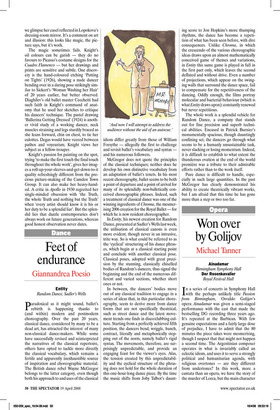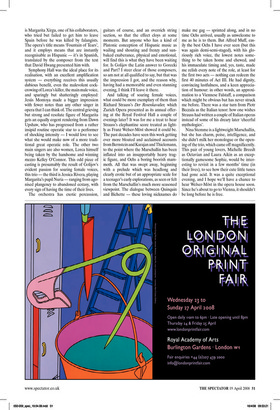Won over by Golijov
Michael Tanner
Ainadamar Birmingham Symphony Hall Der Rosenkavalier Royal Festival Hall
In a series of concerts in Symphony Hall with the perhaps unlikely title Passion from Birmingham, Osvaldo Golijov’s opera Ainadamar was given a semi-staged performance with the cast that made the bestselling DG recording three years ago. It’s repeated at the Barbican. With few genuine expectations and a fairly large dose of prejudice, I have to admit that the 80 minutes the piece takes were mesmerising, though I suspect that that might not happen a second time. The Argentinian composer operates in what is invariably called an eclectic idiom, and uses it to serve a strongly political and humanitarian agenda, with religious overtones — are they different from undertones? In this work, more a cantata than an opera, we have the story of the murder of Lorca, but the main character is Margarita Xirgu, one of his collaborators, who tried but failed to get him to leave Spain before he was killed by falangists. The opera’s title means ‘Fountain of Tears’, and it employs means that are instantly recognisable as Hispanic — it’s in Spanish, translated by the composer from the text that David Hwang presented him with.
Symphony Hall was the ideal place for its realisation, with an excellent amplification system — everything receives this usually dubious benefit, even the malevolent cockcrowing of Lorca’s killer, the main male voice, and sparingly but shatteringly employed: Jesús Montoya made a bigger impression with fewer notes than any other singer in opera that I can think of. The central grieving but strong and resolute figure of Margarita gets an equally cogent rendering from Dawn Upshaw, who has progressed from a rather insipid routine operatic star to a performer of shocking intensity — I would love to see what she would make now of a more traditional great operatic role. The other two main singers are also women, Lorca himself being taken by the handsome and winning mezzo Kelley O’Connor. This odd piece of casting is presumably the result of Golijov’s evident passion for soaring female voices, this trio — the third is Jessica Rivera, playing Margarita’s pupil Nuria — ranging from agonised plangency to abandoned ecstasy, with every sign of having the time of their lives.
The orchestra has exotic percussion, guitars of course, and an overrich string section, so that the effect cloys at some moments. But anyone who has a kind of Platonic conception of Hispanic music as wailing and shouting and frenzy and sunbaked exuberance, physical and emotional, will find this is what they have been waiting for. Is Golijov the Latin answer to Gorecki and Part? I steer clear of those composers, so am not at all qualified to say, but that was the impression I got, and the reason why, having had a memorable and even stunning evening, I think I’ll leave it there.
And talking of soaring female voices, what could be more exemplary of them than Richard Strauss’s Der Rosenkavalier, which Zurich Opera presented as its annual offering at the Royal Festival Hall a couple of evenings later? It was for me a treat to hear Strauss’s elephantine score treated as lightly as Franz Welser-Möst showed it could be. The past decades have seen this work getting ever more bloated and acclaimed accounts from Bernstein and Karajan and Thielemann, to the point where the Marschallin has been inflated into an insupportably heavy tragic figure, and Ochs a boring boorish mammoth. All that was swept away, beginning with a prelude which was headlong and clearly erotic but of an appropriate scale for a teenager’s early explorations, as seen or felt from the Marschallin’s much more seasoned viewpoint. The dialogue between Quinquin and Bichette — these loving nicknames do make me gag — sprinted along, and in no time Ochs arrived, usually as unwelcome to me as he is to them. But Alfred Muff, easily the best Ochs I have ever seen (but this was again demi-semi-staged), with his gloriously rich voice, the lowest notes something to be taken home and chewed, and his immaculate timing and, yes, taste, made me relish every note of the role, at least for the first two acts — nothing can redeem the first 40 minutes of Act III. He had dignity, convincing lustfulness, and a keen appreciation of humour: in other words, an approximation to a Viennese Falstaff, a comparison which might be obvious but has never struck me before. There was a star turn from Piotr Beczala as the Italian tenor: how one wishes Strauss had written a couple of Italian operas instead of some of his dreary later ‘cheerful mythologies’.
Nina Stemme is a lightweight Marschallin, but she has charm, poise, intelligence, and she didn’t milk her monologue or the opening of the trio, which came off magnificently. This pair of young lovers, Michelle Breedt as Octavian and Laura Aikin as an exceptionally gamesome Sophie, would be interesting to revisit in a few months’ time (in their lives), to see how their cute little tunes had gone acid. It was a quite exceptional evening, and I hope we’ll have a chance to hear Welser-Möst in the opera house soon. Since he’s about to go to Vienna, it shouldn’t be long before he is free.



















































































 Previous page
Previous page